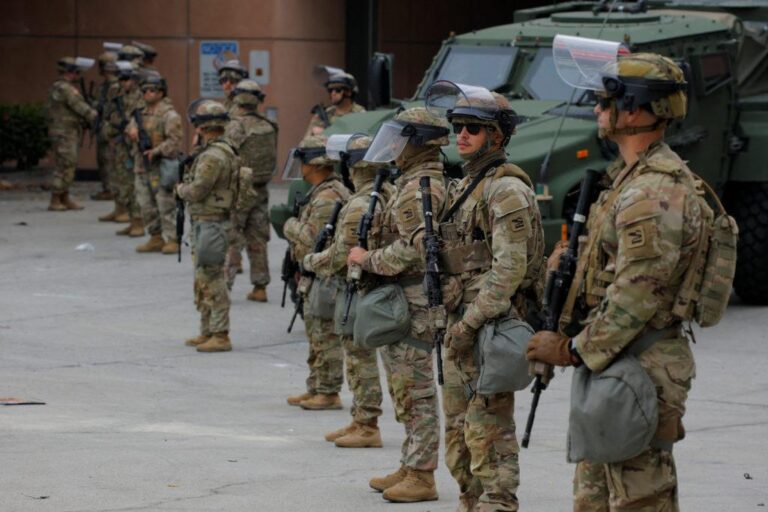Judicial Examination of Trump’s National Guard Deployment in Los Angeles
A federal appellate court is currently scrutinizing the legality of former President Donald Trump’s directive to deploy the National Guard to Los Angeles amid episodes of civil unrest. The court’s analysis centers on whether this military intervention complied with constitutional mandates and statutory laws, especially weighing the tension between federal authority and state sovereignty.This case highlights critical debates about the extent of executive power during domestic crises and the proper utilization of the National Guard under federal command.
The court is addressing several pivotal questions, including:
- Submission of the Insurrection Act: Whether the deployment satisfied the stringent conditions outlined in the Act.
- Federal versus State Jurisdiction: The necessity of gubernatorial approval in federal troop mobilizations.
- Protection of Civil Rights: Assessing the impact on constitutional freedoms during the Guard’s presence.
The main parties involved and their stances are summarized below:
| Party | Stance | Legal Emphasis |
|---|---|---|
| Federal Administration | Endorses the deployment | Legitimate exercise of executive power |
| California State Government | Contests the deployment’s legality | Infringement on state authority and procedures |
| Civil Rights Organizations | Raise alarms | Potential violations of constitutional rights |
Civil Liberties and Local Governance Under Judicial Scrutiny
The ongoing court proceedings have brought to the forefront the delicate balance between federal intervention and local self-governance. Central to the debate is whether the National Guard’s deployment, initiated by the former president, encroached upon constitutional limits and compromised the authority of local governments to oversee their communities. Critics argue that militarizing urban areas without sufficient justification threatens civil liberties, while proponents maintain it was a necessary measure to restore order and protect public safety.
Critical points under examination include:
- The legality of federal involvement in municipal affairs
- Possible infringements on First and Fourth Amendment protections
- Shifts in the power dynamic between state and federal entities
- Long-term consequences for future National Guard activations
| Stakeholder | Concerns | Legal Arguments |
|---|---|---|
| Local Authorities | Diminished control and erosion of public trust | Unlawful encroachment on local governance |
| Federal Officials | Urgency in addressing civil disorder | Mandate to uphold national security |
| Advocates for Civil Liberties | Threats to constitutional freedoms | Potential breaches of civil rights protections |
Legal Experts Discuss Constitutional Boundaries on Federal Military Actions
Opinions among constitutional scholars diverge regarding the extent of federal power to deploy military forces within U.S. cities. While the President holds critically important authority to ensure public safety, this power is circumscribed by laws such as the Posse Comitatus Act and the Insurrection Act.The latter restricts the use of active-duty military in domestic law enforcement except under narrowly defined circumstances authorized by Congress or the President. Critics warn that the National Guard’s deployment to Los Angeles may represent an overextension of federal reach, potentially undermining state sovereignty.
Key constitutional considerations include:
- Division of Authority: Governors generally command National Guard units unless federalized.
- Judicial Checks: Courts serve as a safeguard against unconstitutional military interventions.
- Balancing Act: Weighing public safety needs against the protection of First and Fourth Amendment rights.
| Legal Framework | Meaning |
|---|---|
| Posse Comitatus Act | Limits military involvement in civilian law enforcement |
| Insurrection Act | Permits military intervention during specific emergencies |
| Federalism Principles | Maintains state control over National Guard unless federalized |
Improving Federal-State Collaboration in Emergency Response
Concluding Reflections on Federal National Guard Deployments
As the federal appeals court continues its review of the legal challenges to former President Trump’s National Guard deployment in Los Angeles, the case exemplifies the intricate balance between executive authority and local governance. The court’s ruling will not only affect the immediate parties but also set a precedent influencing how federal forces may be utilized in future domestic situations. Ongoing coverage will track developments and analyze their broader implications for federal-state relations and civil liberties.




